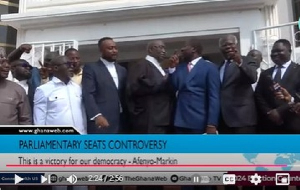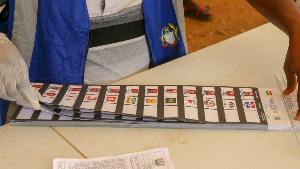The implementation of the 24-hour economy policy proposed by National Democratic Congress (NDC), will expedite land registration and administration, a private legal practitioner, Dr Gad Asorwoe Akwensivie, has said.
He revealed that the policy announced by the flag bearer of the NDC and former President, John Dramani Mahama, would help clear the huge backlog of pending land registration and applications at the Lands Commission.
Speaking at the 2024 African Real Estate Society (AfRES) conference in Livingstone, Zambia, three weeks ago, he noted that, making land administration efficient would help boost the local economy.
This year’s conference brought together more than 1,000 participants from Africa and other continents to discuss and present innovative solutions to real estate challenges under the theme, ‘Smart Cities in Africa for the 21st Century.’
Dr Akwensivie urged the former President to optimise the Office of the Administrator of Stool Lands at the Survey and Mapping, the Public and Vested Land Management, the Valuation and the Land Registration Divisions of the Commission to address pending land registration and documentation.
He further mentioned that some applications for searches and title registrations took more than a year to be completed and that incorporating a shift system into the Standard Operating Procedure (SOP) of the Land Use and Spatial Planning Authority, the Office of the Administrator of Stool Lands would not only help clear the backlog, but shorten the turn-around time.
Dr Akwensivie added that a 24-hour economy would eliminate middle-men also known ‘goro-boys’ and enhance quality delivery service at the Lands Commission.
“People won’t have to use ‘goro-boys’ anymore because if you submit your indenture to the Customer Service and Access Unit (CSAU) and you are sure to get quick service,” Dr Akwensivie added.
He continued: “If the offices work at night, it should be possible for some light documents and non-inspection cases to be completed within a 24-hour cycle.”
Efficient implementation of the 24-hour policy, Dr Akwensivie indicated that, would improve Ghana’s ranking on the World Bank’s Doing Business Report in order to attract foreign direct investment.
Moreover, he said the Lands Commission in particular plays a crucial role in the nation’s development because of the services it rendered.
Dr Akwensivie stated that timely delivery of these services could enable investors make informed decisions on land acquisition in Ghana.
He noted that the 24-hour economy policy would enable financial institutions, including banks to process loan applicants who would not have to wait for one or two months to complete a certificate of search report.
“Estate developers and professionals in the built environment such as architects, surveyors, valuers, civil engineers, quantity surveyors and lawyers who rely on the services of these public sector agencies can expect to render more efficient services to their clients.”
Founded in 1997, AfRES, an African organisation, seeks to promote research, education, and networking among real estate and land experts, and academics across Africa.
Business News of Sunday, 6 October 2024
Source: ghanaiantimes.com.gh
Mahama's 24-hour economy is game changer – Private legal practitioner
Entertainment
















